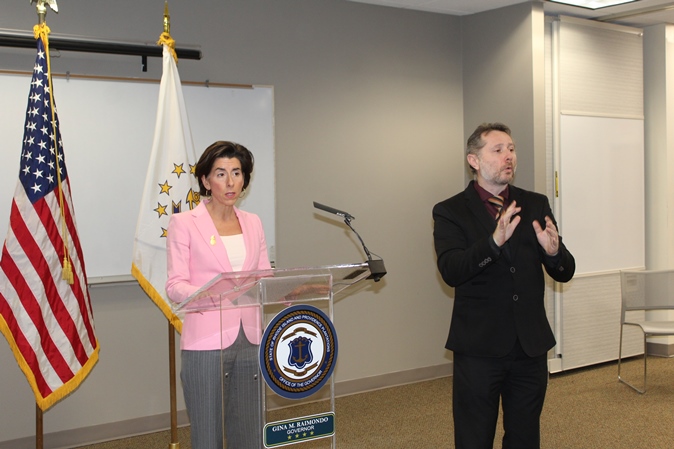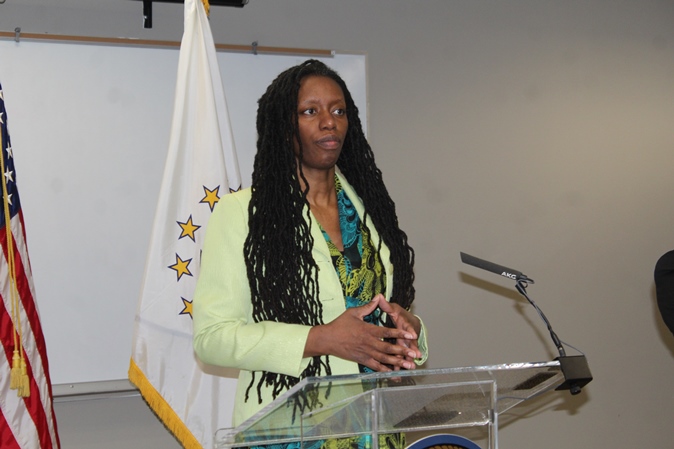
State Services, Public Meetings Moving to Online and Phone Only; Rhode Islanders Encouraged to Avoid DMV
Governor Gina M. Raimondo and Director of Health Nicole Alexander-Scott, MD, MPH today announced that customer-facing services at the Rhode Island Department of Human Services (DHS), Department of Labor and Training (DLT), and HealthSource RI will be moving to online and telephone-only services until further notice. This includes all new applications, renewals, or changes in benefits. Individuals who need to drop off paper applications will be able to do so without speaking with a customer service representative.
The Department of Motor Vehicles (DMV) announced earlier today that licensing road tests will be cancelled through the end of the week. In addition, beginning tomorrow, all DMV satellite offices will be closed. (Closures of the satellite locations in Westerly and Warren has previously been announced).
The Cranston DMV will also be suspending personal driver license and registration services through the end of the week. To ensure customers are not penalized for the actions we are taking to further protect health and safety, the DMV will be extending any driver licenses and registrations scheduled to expire by 30 days. Through the end of this week, the Cranston DMV will be providing only the following limited services: dealer appointments, adjudications, and commercial drivers licenses. Rhode Islanders are encouraged not to go to the DMV this week unless absolutely necessary.
Beginning next Monday, March 23, the DMV will begin taking clients for all services by appointment only. Please check the DMV website to confirm an appointment before visiting the DMV next week.
Finally, this afternoon the Governor will sign an Executive Order allowing all Rhode Island public entities to conduct meetings online or over the phone and extending the timeline for public records requests. The Attorney General’s Office worked with the Governor’s team and other stakeholders on identifying these appropriate temporary measures for both the Open Meetings Act and the Access to Public Records Act to ensure that government can continue to operate as openly and transparently as possible. The Attorney General’s Office will continue to serve as a resource for guidance and advice regarding these statutes going forward.
Data updates
These numbers are also available online.
- Number of Rhode Island COVID-19 positive (including presumptive positive) cases: 21
- Number of people who had negative test results at RIDOH’s State Health Laboratories: 308
- Number of people for whom tests are pending: 149
- Number of people who are currently instructed to self-quarantine in Rhode Island: approximately 2,300. (This number includes approximately 1,700 people from Cranston High School West.)
Testing, including confirmatory testing, in Rhode Island is being done at RIDOH’s State Health Laboratories.

Key messages for the public
- Most people who may get COVID-19 will have mild symptoms and can recover at home.
- If you have traveled anywhere internationally in the last 14 days, self-quarantine for 14 days. That means do not go to work or school and stay at home.
- Avoid all crowded places, large events, and mass gatherings. This is social distancing. However, people should continue doing essential errands (such as going to the grocery store).
- Whenever possible, avoid close personal contact with people in public. When greeting people avoid handshakes and hugs. Additional guidance is available from CDC.
- Although Rhode Island has the testing capacity it needs, people without symptoms should not be tested for COVID-19. Testing individuals with no symptoms is not recommended by CDC.
- People who think they have COVID-19 should call their healthcare provider. These people should not go directly to a healthcare facility without first calling a healthcare provider (unless they are experiencing a medical emergency). Healthcare providers have a dedicated number that they are then using to consult with RIDOH on potential COVID-19 cases.
- Early data suggest that older adults are twice as likely to experience serious COVID-19 illness. RIDOH is reiterating CDC’s guidance for people older than 60 years of age:
- Avoid close contact with people who are sick.
- When greeting people avoid handshakes and hugs.
- Be sure you have over-the-counter medicines and medical supplies (tissues, etc.) to treat fever and other symptoms. Most people will be able to recover from COVID-19 at home.
- Pay attention for potential COVID-19 symptoms including, fever, cough, and shortness of breath. If you feel like you are developing symptoms, call your doctor.
- More information is available from CDC.
- People with general, non-medical questions about COVID-19 can visit www.health.ri.gov/covid, write to RIDOH.COVID19Questions@health.ri.gov, or call 401-222-8022. This is the COVID-19 Hotline that RIDOH has available to the public. The Hotline will be staffed this weekend from 8:00 am to 8:00 pm both Saturday and Sunday. (After hours people are being directed to call 211.)
- Everyone can help stop the spread of viruses in Rhode Island.
- Get your flu shot, and make sure the people around you do the same.
- Wash your hands often throughout the day. Use warm water and soap. If soap and water are not available, use hand sanitizer with at least 60% alcohol.
- Cough or sneeze into your elbow. Viruses can spread by coughing or sneezing on other people or into your hands.
- Stay home from work or school if you are sick.
- Avoid touching your eyes, nose, or mouth. Germs spread this way.

